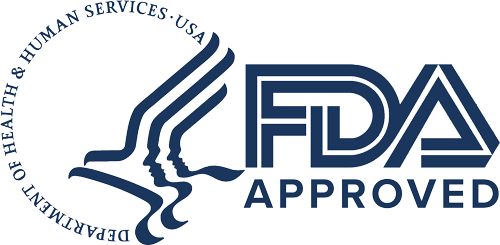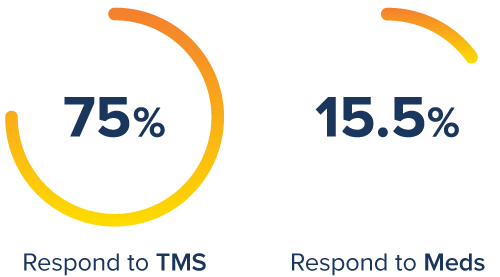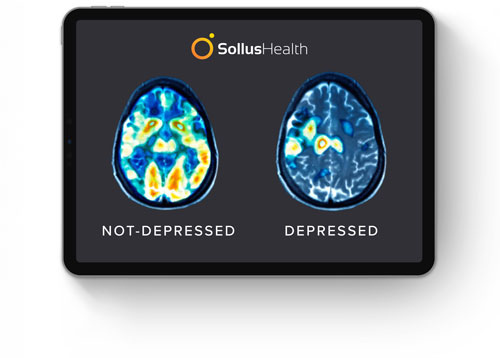TMS Therapy Costs in San Diego





BREAKTHROUGH TECHNOLOGY
Unlock Lasting Relief from Depression With TMS Therapy
TMS therapy in San Diego offers a non-invasive, drug-free approach to treating depression and other mental health conditions.
-
Covered by Insurance
-
FDA Approved
-
Covered by Insurance
-
FDA Approved

TAKE THE FIRST STEP TODAY
TMS Covered by Major Insurance Companies

RESPONSE RATES
TMS Versus Medication

NEUROPLASTICITY
Brain Activity Increased with TMS

Proudly Serving San Diego Carlsbad Encinitas Oceanside San Marcos Vista
Break free from depression
Our team is here to guide you through a personalized journey to reclaim your mental health and regain control of your life.






TMS Therapy Cost in San Diego
For individuals seeking effective treatment options for depression, anxiety, and other mental health conditions, Sollus Health in San Diego offers Transcranial Magnetic Stimulation (TMS) therapy. As a non-invasive, FDA-approved treatment, TMS therapy is an ideal option for many who have not responded well to traditional methods. Below, you’ll find an overview of the cost of TMS therapy in San Diego and details on insurance coverage and self-pay options to help make this treatment accessible.
Does Insurance Cover TMS Therapy?
Many insurance providers recognize TMS therapy as a valuable treatment for major depressive disorder (MDD) and sometimes for other conditions like obsessive-compulsive disorder (OCD). Coverage often varies depending on individual policies, specific conditions, and the patient’s history with traditional treatment options. At Sollus Health in San Diego, we accept insurance plans that cover TMS therapy, including Medi-Cal, helping to ease the financial burden for eligible patients.
If you’re unsure whether your insurance covers TMS therapy, our team at Sollus Health can assist you in determining your benefits and guiding you through any necessary steps to submit a claim. We work closely with patients to explore insurance options and provide all the required documentation to streamline the approval process.
Self-Pay Options for TMS Therapy in San Diego
For patients who do not have insurance coverage for TMS therapy or prefer to pay directly, we offer self-pay options. Schedule a free consultation with our team to explore this option and discuss details. Our priority is to collaborate with patients to ensure they receive the care they need. Contact us to learn more about the cost of TMS therapy and the payment plans we offer.
At Sollus Health, we aim to make TMS therapy accessible by providing flexible payment plans for our self-pay patients, helping to spread out the cost over time.
Is TMS Therapy in San Diego Worth the Investment?
TMS therapy has shown significant success rates, especially for individuals with treatment-resistant depression. The non-invasive nature of the therapy, along with its minimal side effects, makes it a valuable investment in mental health. Unlike medications, which may come with long-term costs and side effects, TMS therapy in San Diego is typically completed within a few weeks, and many patients report long-lasting improvements in mood, focus, and overall quality of life.
How to Get Started with TMS Therapy in San Diego at Sollus Health
If you’re considering TMS therapy and want to explore cost options, our team at Sollus Health in San Diego is here to help. We offer a comprehensive consultation to discuss your treatment goals and provide transparent pricing information tailored to your financial and medical needs. Whether you’re using insurance or opting for a self-pay plan, we’re committed to supporting you every step of the way.
Take the First Step Toward Better Mental Health With TMS Therapy
Curious about whether TMS therapy is right for you? Contact Sollus Health in San Diego to schedule a consultation, discuss pricing options, and explore whether insurance-based or self-pay options work best for you. Let us help you find the right pathway to improved mental health.
COMPASSION. HOPE. ACTION
Conditions We Treat
Sollus Health offers effective, non-invasive treatment for conditions like depression, OCD, PTSD, and anxiety.
YOUR QUESTIONS ANSWERED
FAQs About TMS Therapy



Can't find what you're looking for? Get in touch with our team and we will gladly help out.
Transcranial Magnetic Stimulation (TMS) is a non-invasive procedure used to stimulate nerve cells in the brain using magnetic fields. It is primarily employed in the treatment of depression, particularly in cases where traditional treatments like medication or psychotherapy have been ineffective
Transcranial Magnetic Stimulation (TMS) works by using magnetic fields to stimulate specific regions of the brain involved in mood regulation, particularly the prefrontal cortex, which is often underactive in individuals with depression. The magnetic pulses generated during TMS induce electrical currents in the brain, which can modulate neuronal activity. This stimulation helps to "retrain" the brain's neural circuits, improving communication between different regions that regulate emotions and cognitive function. Over time, repeated stimulation can promote neuroplasticity, allowing the brain to reorganize itself and function more effectively. This increased neural activity is believed to alleviate symptoms of depression and other mental health conditions.
TMS has been shown to be highly effective, particularly for treating major depressive disorder (MDD), especially in patients who do not respond well to antidepressants or psychotherapy. Clinical studies suggest that around 80% of patients experience significant improvement in their depressive symptoms, and about 50% achieve full remission.
TMS therapy is generally well-tolerated and considered a comfortable procedure for most patients. During the session, an electromagnetic coil is placed on the scalp, and patients feel a tapping sensation or mild knocking on the head as the magnetic pulses are delivered. Some people may also experience slight discomfort or tingling at the treatment site, particularly in the first few sessions, but this usually lessens over time. There may be an audible clicking sound as the machine operates, and patients often wear earplugs to reduce any noise-related discomfort.
TMS is generally well-tolerated, with most side effects being mild and temporary. The most common side effect is discomfort or mild pain at the treatment site, particularly during the first few sessions, which usually decreases as the scalp becomes accustomed to the stimulation.
A typical course of TMS therapy lasts about 4 to 6 weeks, with patients receiving treatment five days a week. Each session generally lasts between 20 to 40 minutes, depending on the specific protocol being used and the individual's condition.
TAKE THE FIRST STEP TODAY
A Simple Process to Begin Your TMS Journey
Take the first step toward lasting relief from depression with TMS therapy, a non-invasive, medication-free treatment designed to restore your well-being.
Break free from depression
Our team is here to guide you through a personalized journey to reclaim your mental health and regain control of your life.

BREAKTHROUGH TECHNOLOGY
Latest News and TMS Innovation
Discover the latest breakthroughs in TMS technology. Our innovative advancements enhance precision and effectiveness, bringing hope to more patients in San Diego.